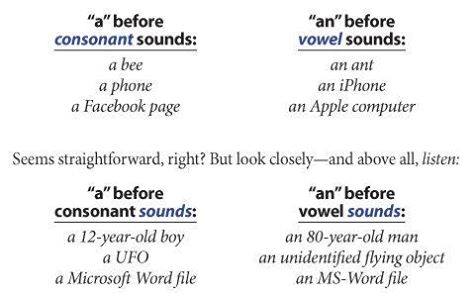Indefinite articles introduce a noun or a noun phrase and imply that the thing referred to is nonspecific. In English, there are two indefinite articles; they are “A” and “AN.”
Most of us in school learned that you use “A” when the next word starts with a consonant and you use “AN” when the next word starts with a vowel.
For example, “She gave me A book.”
For example, “He saw AN ostrich at the zoo.”
However, that is NOT correct! Though it works a lot of time, it is actually not the criterion for determining the indefinite article. Here’s why:
What happens when a consonant SOUNDS like a vowel? Or what happens when a vowel SOUNDS like a consonant? The rule of thumb no longer works.
Ultimately, it is SOUND, not letter, that matters when determining “A or “AN.” Let’s look at some tricky examples:
Use “A” before a word such as “university.” it sounds like it starts with a consonant even though the first letter is a vowel. (“He went to A university on the West Coast.”)
Use “A” before letters and numbers that sound like they begin with a consonant. For example, “1” is spelled O-N-E, but it it is pronounced “won”, as if it starts with a “W”. (“That is A one-time deal”).
Use “AN” before words such as “hour” that sound like they start with a vowel even though the first letter is actually a consonant. (“They arrived AN hour before the game started to get good seats.”)
Use “AN” before letters and numbers that sound like they begin with a vowel, such as “F” or “M”. For example, “F” is pronounced “eff”, as if it starts with an “E”. (“She was actually AN FBI informant.”)
Remember, listen to the sound of the word following the indefinite article. If it makes a consonant sound, use “A” and if it makes a vowel sound, use “AN.”

